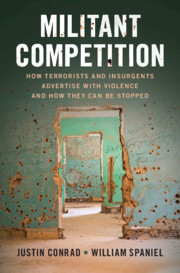 Militant Competition
Militant Competition Book contents
- Frontmatter
- Contents
- List of Tables
- List of Figures
- Acknowledgments
- 1 Introduction
- 2 A Formal Model of Outbidding
- 3 The Evidence
- 4 Outbidding, Capacity, and Government Enforcement
- 5 Outbidding as Deterrence: Endogenous Demands in the Shadow of Group Competition
- 6 Cornering the Market: Counterterrorism in the Shadow of Group Formation
- 7 Conclusion
- Bibliography
- Index
3 - The Evidence
Published online by Cambridge University Press: 17 September 2021
- Frontmatter
- Contents
- List of Tables
- List of Figures
- Acknowledgments
- 1 Introduction
- 2 A Formal Model of Outbidding
- 3 The Evidence
- 4 Outbidding, Capacity, and Government Enforcement
- 5 Outbidding as Deterrence: Endogenous Demands in the Shadow of Group Competition
- 6 Cornering the Market: Counterterrorism in the Shadow of Group Formation
- 7 Conclusion
- Bibliography
- Index
Summary
We directly assess the empirical evidence of the propositions derived in the previous chapter. First, we conduct a large-n analysis of terrorist violence in every country between 1970 and 2015. We then examine whether there is a relationship between the number of active militant groups in a state and the aggregate amount of violence. We find evidence to support the basic outbidding hypothesis: more militant groups are significantly associated with more violence at the state level. We subsequently analyze the effect of increasing numbers of groups on per group violence. In accordance with our model expectations, we find that while increasing competition appears to lead to more violence overall, per group violence declines on average. Finally, to more fully explore the causal mechanisms at work in this process, we examine in detail the multi-dimensional insurgency in Northeast India since 2009. We find that as aggregate violence in the country and the region increased, groups curtailed their own use of violence due to concerns over diminishing returns and increased costs.
- Type
- Chapter
- Information
- Militant CompetitionHow Terrorists and Insurgents Advertise with Violence and How They Can Be Stopped, pp. 57 - 89Publisher: Cambridge University PressPrint publication year: 2021


